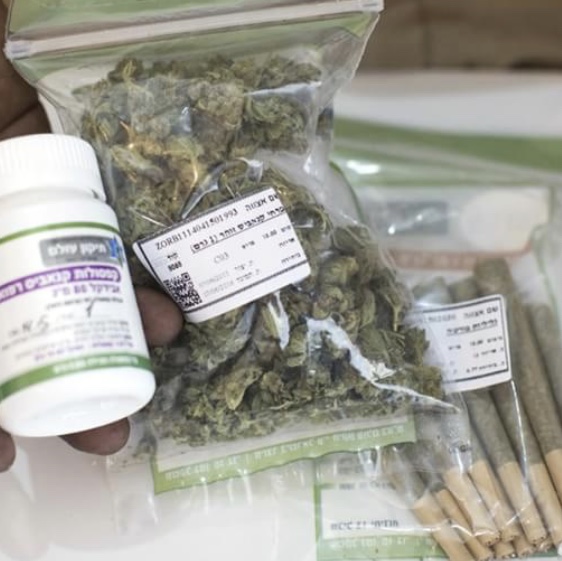New Study Suggests Pot Could Help End Opioid Dependency
Research from Israel shows cancer patients reduced opioid use when they started using medical pot

Tikun Olam is one of eight companies in Israel that provides medical marijuana to patients
The United States sees more than 12.7 million new cancer cases a year – and among those who must undergo surgery, one in 10 will become dependent on opioid pain relievers. With America’s opioid epidemic killing 116 people everyday from lethal overdoses, dependence on pain medications is a close rival to cancer itself as a serious threat to patients’ lives.
Cannabis, however, could be helpful to patients because it potentially targets a variety of symptoms all at once, serving the same purpose as a cocktail of pharmaceutical medications – especially opioids. And while much research is still needed, the preliminary findings seem promising.
In a new study published in the European Journal of Internal Medicine, researchers from Tikun Olam, the largest medical marijuana provider in Israel, investigated the efficacy of cannabis for cancer patients. What they found was that, at least for cancer patients, marijuana could help stop opioid dependency before it starts. “Cannabis is a very good alternative to reduce opioid consumption, to increase quality of life, and to reduce pain, nausea and vomiting,” says Lihi Bar-Lev Schleider, lead researcher on the study. The study found cannabis to be most effective in reducing patients’ use of opioid painkillers within six months of initial intake. While this wasn’t a clinical study, the research looks at an expansive collection of anecdotal evidence from Tikun Olam patients, proving the efficacy of cannabis.
Because of the way medical marijuana laws are set up in Israel – patients sign up with only one of the country’s eight cannabis companies, and pay a monthly fee of 370 shekels, or about $100, regardless of how much the patient actually needs – Schleider had a captive audience. Tikun Olam routinely collects data from its 2,970 cancer patients, and Schleider was able to use that data to study how cannabis influenced their pain scale, quality of life, symptoms of the disease, and consumption of other medications.
At intake, more than 1,000 of the patients regularly took nearly 4,000 medications altogether. Opioids were the most widely used drug – the “cornerstone medication for the treatment of cancer pain,” as the researchers wrote – consumed by about a third of patients at intake. By the end of the study, 36 percent of those patients stopped taking opioids and about 10 percent reduced the dose.
The Tikun Olam study isn’t unique in parading the benefits of cannabis for cancer, or for the treatment of pain. What is unique about it, however, is that the patients who responded to the questionnaire weren’t self-selecting, but rather required to as part of Tikun Olam’s program, Schleider explains. “Cannabis surveys usually rely on answers from willing patients, only patients who want to answer the questionnaire because they experienced improvement in their conditions,” she says. Tikun Olam’s study looks at everybody, including the patients who passed away or who quit the cannabis program — it didn’t only rely on happy patients.
Even so, cannabis research is easier to conduct in Israel because the medical program is completely legal, with the support of both government and academia. Schleider, Tikun Olam’s research manager, is also a PhD student in medicine at the clinical research center in Soroka Hospital and Ben Gurion University. She studies under notable cannabis scientists Victor Novack and the pioneering Raphael Mechoulam, who discovered THC, cannabis’ main psychoactive compound, in 1963. For decades, the police had even provided Mechoulam with hash for his research.
The comprehensiveness of this study also distinguishes it, since nobody has ever looked at this many patients at once, says Sid Taubenfeld, CEO of Tikun Olam Pharma, a United States branch of the company. The repercussions of this study could be far reaching, with the potential to influence doctors’ perception of cannabis from Israel to America.
“If you look at this study and you’re a doctor and your patients are suffering with opioids, you’d be hard pressed not to give them cannabis,” Taubenfeld says. “The same for steroids, or any sleep medication. You see the quality of life was so staggering that you should consider cannabis.” The breadth of the observational evidence should sway attitudes within the medical community, or at least spotlight cannabis on doctors’ radar, he adds.
“Cannabis is not magic,” Schleider says. “But for some patients, in one treatment, we target many symptoms and on top of all that we reduced the number of medications they were taking.” And if cannabis could substitute opioid painkillers, not only does that improve patients’ quality of life, but reduces their risk of dependence or fatalities in their final days.
Retrieved from: https://www.rollingstone.com/culture/news/new-study-suggests-pot-could-help-end-opioid-dependency-w517178

